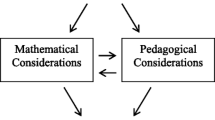Abstract
Siegler's rule assessment methodology was used to investigate the cognitive effects of a 32 hour mathematics in-service workshop on 28 elementary shool teachers. This paper reports on attempts (a) to assess the levels of cognitive understanding of the basic concepts of proportion, probability, and correlation among elementary teachers, and (b) to change teachers' levels in understanding these concepts by a method of “direct instruction”. Significant improvements were noted in the levels of cognitive development associated with the concept of proportion. Though nonsignificant improvements were noted in the concepts of probability and correlation, all the teachers were assigned to the highest cognitive rule associated with the probability concept at the end of the workshop.
Similar content being viewed by others
References
Awang, M. (1984). Rule usage in solving formal operational problems among Malay and Euro-American college students: an evaluation of the rule assessment tests. Unpublished doctoral dissertation, University of Minnesota, Minneapolis.
InhelderB. and PiagetJ. (1958). Growth of logical thinking from childhood to adolescence. New York: Basic Books.
KarplusR. (1981). Education and formal thought: a modest proposal. In I. E.Sigel (Ed.), New directions in Piagetian theory and practice, Hillsdale, NJ: Lawrence Erlbaum Associates.
KarplusR., PulosS. and StageE. K. (1983). Early adolescents' proportional reasoning on “rate” problems. Educational Studies in Mathematics, 14, 219–233.
LacampagneC., PostT., HarelG. and BehrM. (1988). A model for the development of leadership and the assessment of mathematical and pedagogical knowledge of middle school teachers. PME-NA Proceedings of the Tenth Annual Meeting. DeKalb, IL: PME-NA.
LakatosI. (1970). Falsification and the methodology of scientific research programs. In I.Lakatos and A.Musgrave (Eds.), Criticism and the growth of knowledge (pp. 91–196). Cambridge: Cambridge University Press.
MiniumE. W. (1978). Statistical reasoning in psychology and education. New York: John Wiley and Sons.
McKinnonJ. and RennerJ. (1971). Are colleges concerned with intellectual development?American Journal of Physics, 39, 1047–1052.
National Council of Supervisors of Mathematics (1978). Position paper on basic skills. Arithmetic Teacher, 25 (October), 18–22.
National Council of Teachers of Mathermatics (1980). An agenda for action: recommendations for school mathematics of the 1980s. Reston, VA: NCTM.
Petkovich, M. D. (1986). Teaching algebra with worked examples: the effects of accompanying text and range of examples on the acquisition and retention of a cognitive skill. Unpublished Doctoral Dissertation (Department of Educational Psychology), University of Minnesota.
PostT., HarelG., BehrM. and LeshR. (1988). Intermediate teachers' knowledge of rational number concepts. Madison, WI: National Center for Research in Mathematical Sciences Education.
PopperK. (1963). Conjectures and refutations: the growth of scientific knowledge. New York: Harper Torchbook.
RoschE. (1975). Cognitive representations of semantic categories. Journal of Experimental Psychology: General, 104, 192–233.
RoschE. (1978). Principles of categorization. In E.Rosch and B.Lloyd (Eds.), Cognition and categorization (pp. 9–31). Hillsdale, NJ: Lawrence Erlbaum Associates.
SchwebelM. (1975). Formal operations in first-year college students. Journal of Psychology, 91, 133–141.
SiegelS. (1956). Nonparametric statistics for the behavioral sciences. New York: McGraw-Hill.
SieglerR. S. (1976). Three aspects of cognitive development. Cognitive Psychology, 8, 481–520.
SieglerR. (1987). Children's thinking. Englewood Cliffs, NJ: Prentice Hall.
Siegler, R. (1981). Developmental sequences within and between concepts. Monographs of the Society for Research in Child, Development, 44(2, Whole No. 198).
SmithE. and MedinD. (1981). Categories and concepts. Cambridge, MA: Harvard University Press.
TennysonR., SteveM. and BoutwellR. (1975). Instance sequence and analysis of instance representation in concept acquisition. Journal of Educational Psychology, 76, 821–827.
TennysonR., YoungersJ. and SuebsonthiP. (1983). Acquisition of mathematical concepts by children using prototype and skill development presentation forms. Journal of Educational Psychology, 75, 280–291.
Author information
Authors and Affiliations
Rights and permissions
About this article
Cite this article
Bart, W.M., Orton, R.E. The cognitive effects of a mathematics in-service workshop on elementary school teachers. Instr Sci 20, 267–288 (1991). https://doi.org/10.1007/BF00043254
Issue Date:
DOI: https://doi.org/10.1007/BF00043254




